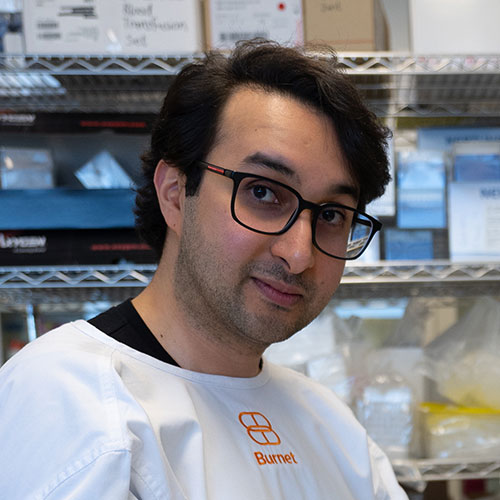Dr Adam Thomas
Senior Research Officer - Malaria Vaccines
Working groups

Background
Adam is a molecular biologist and biochemist. During his PhD, he investigated the Mycobacterium species and characterised the Pup-Proteasome system that is crucial for pathogenic mycobacteria to survive hostile environments inside macrophages and persist inside the host.
Shortly after his PhD, Adam joined the pharmaceutical industry as a scientist at CSL’s Recombinant and Gene Product Development group where he gained valuable experience in various pharmaceutical products development, large scale manufacturing, quality control and quality assurance.
After a few years at CSL, Adam joined St Vincent’s Institute of Medical Research working on an oncology-focused project with Pfizer’s Centres of Therapeutic Innovation. This collaboration aimed to identify potential new small molecules that target the DNA damage response, which is common to most cancers.
After completing the Pfizer project, Adam joined La Trobe University working in research administration, specifically reporting on realised research impact beyond academia. He ensured La Trobe University’s continuous success in the Times Higher Education Impact ranking by aligning its operations and outputs with the United Nations Sustainable Development Goals (SDGs).
Adam is currently a senior research officer at Burnet working on malaria vaccines development as part of the Burnet Vaccine Initiative, while also serving as the President of the Students and Early Career Professional group at the Parenteral Drug Association in Australia (PDA Australia Chapter).
Qualifications
- 2019: PhD in Biochemistry and Molecular Biology, La Trobe University, Australia
- 2014: Master of Biotechnology and Bioinformatics, La Trobe University, Australia
- 2012: Bachelor of Science (double major in Microbiology and Molecular Biology), Monash University, Australia
Appointments
- 2023: President, Students & Young Professionals sub-chapter of the Parenteral Drug Association (PDA)
- 2021: Vice President, Students & Young Professionals sub-chapter of the Parenteral Drug Association (PDA)
- 2019: Health and Safety Representative (HSR), CSL Limited
- 2014: Public Relations Officer, La Trobe International
- 2013: President, Biochemistry Society, La Trobe University
Awards
- 2014: Community Engagement Award, La Trobe University, Australia
Positions
- 2023: Postdoctoral Research Officer, Burnet Institute, Australia
- 2022: Research Impact Coordinator, La Trobe University, Australia
- 2021: Senior Research Assistant, St Vincent's Institute of Medical Research, Australia
- 2019: Scientist, CSL Limited Recombinant & Gene Product Development, Australia
- 2019: Postdoctoral Research Officer, La Trobe University, Australia
- 2019: Teaching Associate, Monash University, Australia
- 2018: Research Assistant, La Trobe University, Australia
- 2015: Teaching Associate, La Trobe University, Australia
Reports and other work
-
The Optimise Study: A rapid survey examining concerns about children returning to school in 2022. (PUBLIC HEALTH REPORT)
The Optimise Study has followed a cohort of around 700 Victorians since September 2020. A rapid survey was conducted between 4 and 14 March 2022 to assess Optimise participants' concerns about children returning to school, COVID-19 testing in schools, views about COVID-19 prevention measures taken in schools, and the acceptability of closing schools under certain circumstances.
The Optimise Study: A rapid survey examining concerns about children returning to school in 2022. (PUBLIC HEALTH REPORT)
Current projects
View 1 more
Discovering the mechanisms and targets of immunity against malaria
In the fight against malaria, we're exploring antibodies that can directly inhibit host cell infection, interact with immune cells to kill and clear malaria or recruit the body’s complement system to neutralise infection.
Malaria Synergy Program
The program brings together experts to achieve the goals of malaria elimination in the Asia-Pacific region and globally.
MASTER-MAP: modern acceleration strategies for eradication of malaria in the Asia Pacific
We're developing novel solutions and high-quality evidence to inform policies and practices that address the major barriers in malaria elimination.



